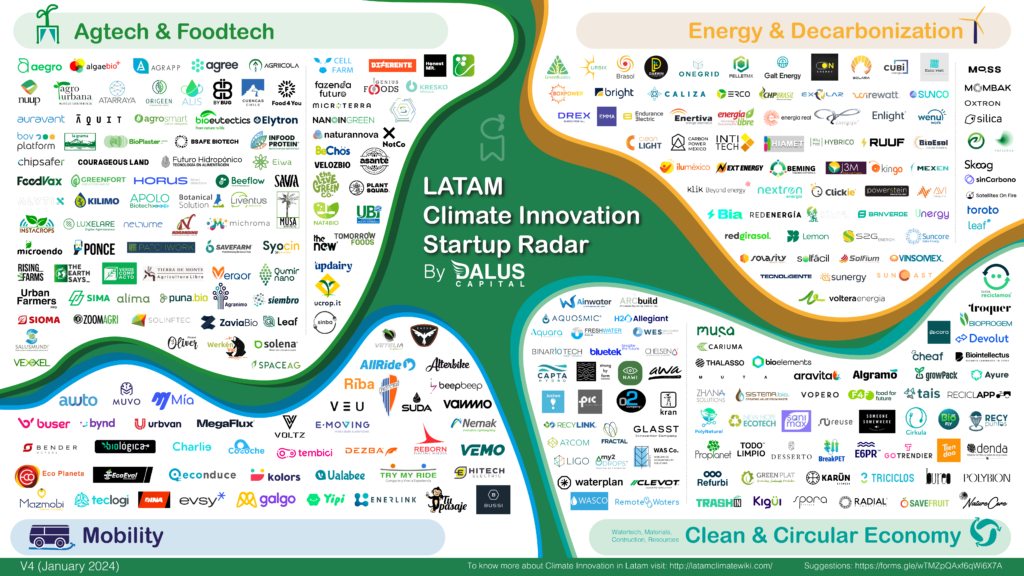Revamping our Latam Climate Innovation Startup Radar: A Clearer Vision for a Sustainable Future
by Gabriel Estrada and Paloma Pradillo
Latin America is facing profound climate changes, including rising temperatures, increased extreme weather events, changing rainfall patterns, and rising sea levels. Consequences are already affecting the region, including more recurrent coastal impacts and droughts. Anticipated disruptions encompass adverse effects on ecosystems and biodiversity, impact on food production and water supply, and heightened risks to people in both urban and rural settings, such as displacement. Urgent, coordinated efforts are crucial to address these evolving challenges and enhance the region’s resilience. Consequently, the demand for innovative climate solutions has never been more critical.
It is important for us to create initiatives that encourage climate innovation and to support startups that drive meaningful change and create a positive impact. One of our initiatives is the Latam Climate Innovation Startup Radar, where we classify startups into different verticals. Our team has diligently worked to continually enhance these initiatives, introducing significant revisions to our vertical classifications compared to the previous version of the Radar, aiming to enhance its precision and relevance. These changes have also been applied to our complementary initiative, the LATAM Climate Wiki.
We invite you to discover these new categories and meet startups focused on reshaping the world. This is a story of innovation and hope as Latin America journeys towards a greener, more sustainable future.

One of the pivotal changes we’ve implemented on our radar is the introduction of the Clean & Circular Economy vertical. The clean economy aims to transform well-established industrial and economic practices into sustainability, while the circular economy looks to minimize waste and make the most of resources.
Clean Economy embodies the idea of producing no more climate pollution than we can effectively remove. This isn’t merely an ambitious goal; it’s an urgent necessity in the face of escalating climate challenges. It calls for reevaluating our approaches across various sectors, including production, construction, and resource management. Here are some trends that we see:
- Sustainable Construction: Traditional construction practices often result in a significant carbon footprint. Embracing sustainable construction can substantially reduce emissions by incorporating eco-friendly materials, energy-efficient designs, and waste-reduction strategies. Strong by Form in Chile has developed high-performance timber-based biocomposites that are able to replace steel, aluminum, and concrete in construction and mobility. Was Co in Mexico develops sustainable construction materials based on recycled polymer compounds.
- WaterTech: Water scarcity and pollution are critical global concerns. WaterTech startups are at the forefront of developing innovative solutions for sustainable water conservation, purification, and management. For instance, Waterplan helps companies like Amazon and Danone measure, respond to, and report on water risk.
Circular Economy platforms involve sharing, reusing, refurbishing, and recycling materials and products for as long as possible.
- Recycling and Waste Management: Startups in this vertical focus on advanced recycling technologies, waste sorting solutions, and efficient waste management systems to increase recycling rates and reduce landfill waste. Musa in Brazil and Muta in Colombia have developed platforms that connect waste generators, transporters, and recyclers to ensure recycling.
- Food Waste Reduction: Companies in this vertical work on solutions to reduce food waste at various stages of the supply chain, from farming and distribution to retail and consumers. Aravita is developing a SaaS using artificial intelligence to help retailers in Brazil place fresh food orders, avoiding spoilage due to overstocking or lost sales due to understocking.
- Reuse Platforms: These platforms encourage the reuse of products, diverting them from the traditional linear model of consumption and disposal. They facilitate the exchange of second-hand or open-box goods, allowing individuals or businesses to give away, sell, or trade items. Companies like Reuse and Trocafone look to reduce electronic waste and serve a high-demand consumer market for products like refurbished or used cell phones and computers.
- Sustainable Packaging & Products: Sustainable packaging and products are designed to minimize the carbon footprint compared to traditional materials, offering eco-friendly packaging materials and products with lower environmental impacts. Algramo from Chile operates a platform aimed at reducing single-use plastic packaging for consumer products.
- Textile Recycling and Fashion: The fashion and textile industries generate a substantial amount of waste. Startups in this sub-vertical focus on recycling textiles, creating sustainable fabrics, and promoting circular fashion practices. For instance, Someone Somewhere creates and manufactures sustainable textile-based products for corporations by using circular materials and a supply chain based on indigenous artisans. GoTrendier and Troquer, on the other hand, have developed marketplaces enabling people to buy and sell pre-owned fashion items.
- Circular Supply Chain and Logistics: Companies in this vertical work on optimizing supply chains for circularity, including reverse logistics for product returns and sustainable packaging solutions for transportation. Devolut has developed a reverse logistics tool to help e-commerce brands optimize returns while reducing their carbon footprint.

Energy production and consumption contribute to roughly three-quarters of global greenhouse gas emissions, making them the most critical components of a net-zero emissions strategy for many countries. Three main strategies can help countries meet their energy needs with zero-carbon emissions: optimize and enhance energy efficiency by refining existing processes and technologies to minimize energy consumption; electrify to shift energy demand towards electricity and away from fossil fuel combustion, especially in transportation and heating, and decarbonize generation to transition entirely to zero-carbon technologies for electricity generation, such as wind, solar, and hydropower, while phasing out fossil fuel-based power.
We see energy startups working to promote the use of renewable energy sources in different parts of the value chain:
- Renewables Generation: Startups in this category develop innovative technologies and solutions for renewable energies, including solar, wind, hydropower, biomass, green hydrogen, and geothermal. We see solar energy platforms like Solara, Solfácil, and Solfium developing software and financial products to increase the adoption of solar generation in Latam.
- Distribution and Commercialization: Some startups focus on energy distribution systems to help make energy more affordable and sustainable. For example, Lemon connects retail power consumers with clean energy generators in Brazil. Bia Energy allows businesses in Colombia to save on their energy bills, monitor consumption, and contribute to environmental protection.
- Storage: Encompasses batteries and alternative systems that help store excess energy generated during low-demand periods and release it during peak demand, balancing the load on the grid and ensuring a stable energy supply. Urbix specializes in the graphite value chain, advanced energy storage cell designs, and materials, including high-voltage electrolytes.
The Decarbonization space focuses on developing and implementing innovative technologies, products, and services to reduce or eliminate carbon emissions. We see startups tackling this from multiple angles:
- Carbon Capture: Companies working on capturing carbon dioxide emissions from industrial processes and finding ways to utilize or store the captured carbon. Silica is doing CO2 removal through rock weathering. The rocks are spread in croplands to release essential nutrients into the soil, which improves agricultural productivity.
- Carbon Offsets: Platforms that enable an exchange of “rights” or certificates linked to activities that lower the amount of carbon dioxide. Mombak develops forestry projects that capture atmospheric CO2, starting in the Amazon, and sells carbon credits in the voluntary market.
- Wildfire Tech: encompasses a wide range of tools, equipment, and strategies designed for the early detection, monitoring, prevention, and response to wildfires, which is a growing problem with climate change. These technologies are crucial in managing and mitigating the impact of wildfires on communities and ecosystems. Satellites on fire from Argentina and Umgrauemeio from Brazil have developed real-time AI wildfire detection systems leveraging satellite and camera technologies.
- Emissions Monitoring: Platforms that enable organizations to monitor, manage, and reduce their emissions play a crucial role in decarbonization. These platforms provide data-driven insights and actionable steps to minimize environmental impact. For example, LEAF has developed a carbon accounting SaaS to empower companies towards sustainability.

The global agricultural industry is undergoing significant transformation due to increasing food demand, land constraints, rising energy and labor costs, and climate-related pressures. However, Latin America stands out by significantly boosting agricultural productivity compared to other developing regions. Innovations and technological advancements in agriculture, collectively known as AgTech (agricultural technology), are poised to impact the region’s health and well-being profoundly:
- Precision Agriculture: Software solutions are improving observation, measurement, and response to crop variability, increasing yield, shelf life, and consistency. Solinftec offers solutions for real-time monitoring, optimization, and traceability of agricultural operations.
- Farm Management Software: These solutions address unique challenges faced by industrial and small production farms, offering remote fleet management, SaaS platforms using IoT for tracking, and education platforms for scaled production. Eiwa provides a data management platform used by agriculture companies.
- New Crop Production Systems: Innovations in smart irrigation, vertical farming, and soil conservation challenge traditional food production methods, particularly in the face of volatile climate events. Kilimo is a Big Data solution for water management in agriculture. It features climate monitoring by using satellite and site data to provide prescriptions for each crop and increase water use efficiency.
- Agricultural Financing: Solutions that facilitate credit, resources, buyer networks, and guidance, transforming agricultural practices in Latin America for sustainability and innovation. Verqor offers cashless credits to farmers in Mexico, empowering them to purchase essential farming inputs. It enhances producers resilience against climate change and encourages the adoption of regenerative agriculture.
- Supply Chain Innovation: Climate startups optimize the supply chain to reduce food waste. Using technology to monitor transportation, storage, and distribution, these startups help prevent spoilage and ensure agricultural products reach consumers efficiently. Zoomagri has developed a platform that assesses the quality and purity of agricultural commodities before and after planting. Their solutions are utilized by various supply chain participants, helping reduce waste.
- Biotechnology: Entrepreneurs across Latam are offering solutions related to synthetic fertilizers, seed genomics, and genetic modification to optimize livestock lifespan and output, as well as technology for altering seeds, soil, and produce efficiently. PunaBio develops biological inputs for agriculture that increase yields, reduce carbon emissions, and restore degraded soil. Beeflow’s bee health supplements and bee hive management supercharge pollination, increasing crop yields and improving the quality of fruits and seeds. Vexxel has developed smart biocapsules for agricultural inputs that enhance crop production.
In FoodTech, advancements in food science have illuminated the environmental impact of traditional farming and offer cost-efficient alternatives such as synthetic meats, plant-based products, and sustainable alternatives like kelp-based corn substitutes. NotCo recreates animal products like meat and dairy through sustainable plant alternatives. Michroma develops fungal-based biofactories to produce natural ingredients in a sustainable, scalable, and cost-effective way. microTERRA produces nutritional & functional ingredients for plant-based foods in an affordable and sustainable way.
These innovations, alongside AgTech, play a crucial role in reducing the environmental footprint of our food system without requiring drastic changes in consumer behavior.

Transportation has emerged as a primary contributor to the ongoing climate change crisis, responsible for roughly 25% of all greenhouse gas emissions. According to PwC, an astonishing 72% of these emissions come from road transportation. Innovation within this sector plays a pivotal role in our pursuit of achieving net-zero emissions. Crucial advancements are required in technologies like electric vehicles, alternative fuels, shared transportation, and other highly efficient modes of transport. This underscores the significance of including the Mobility category in our radar:
- Micro Mobility: Refers to transportation solutions involving small and lightweight devices with a maximum speed of 25 km/h, which offer opportunities for urban citizens and increase access to public transportation. For instance, companies like Tembici lead the way by providing a shared bike system in Brazil.
- Low Emission Road Transport: Covering any road vehicle, from cars to trucks, that produces low greenhouse emissions, such as electric, solar-powered, or other low-emission systems. Vemo has developed a clean mobility ecosystem combining charging infrastructure, proprietary ride-hailing services, and commercial fleet solutions. Galgo has developed a motorcycle marketplace and fintech in Spanish-speaking Latam with a growing participation in electric vehicles. Vammo aims to scale e-motorcycle battery swapping in the region through a subscription model. MegaFlux tailors electric vehicle solutions for last-mile delivery commercial fleets.
- Efficient Transport Systems: These solutions enhance transportation quality, reduce emissions, improve air quality, decrease traffic, and optimize streets for all modes of transportation. Buser is a collaborative charter platform in Brazil that connects travelers who want to the same destination for inter-city transportation.
We invite you to explore our revamped radar and join us on this exciting journey towards climate innovation. Together, we can make a tangible difference in the fight against climate change.
References:
Effects of climate change in Latin America and the Caribbean. (2023, 21 November). Development Bank of Latin America and the Caribbean (CAF).
https://www.caf.com/en/currently/news/2023/11/effects-of-climate-change-in-latin-america-and-the-caribbean/#:~:text=The%20increase%20in%20temperatures%2C%20the,Latin%20American%20and%20Caribbean%20populations
Climate Change Impacts in Latin America. (s. f.). World Wide Fund for Nature.
https://www.wwfca.org/en/our_work/climate_change_and_energy/climate_change_impacts_la/
Circular Economy: Definition, importance, and benefits. (s. f.). European Parliament. https://www.europarl.europa.eu/news/en/headlines/economy/20151201STO05603/circular-economy-definition-importance-and-benefits#:~:text=What%20is%20the%20circular%20economy,cycle%20of%20products%20is%20extended.
Industrial Innovation & Decarbonization. (2023, 26 July). World Resources Institute. https://www.wri.org/initiatives/industrial-innovation-decarbonization
Why our changing climate needs a 100% clean economy. (s. f.). Environmental Defense Fund. https://www.edf.org/climate/100-percent-clean#:~:text=A%20100%25%20clean%20economy%20means,by%202050%20at%20the%20latest.
DOE Industrial Decarbonization Roadmap. (s. f.). Energy.gov. https://www.energy.gov/industrial-technologies/doe-industrial-decarbonization-roadmap
Climate Wiki (s. f.). https://latamclimatewiki.com/

